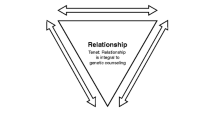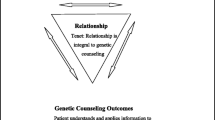Abstract
Background
Family physicians (FPs) are increasingly involved in delivering genetic services. Familiarization with aspects of genetic counseling may enable FPs to help patients make informed choices.
Purpose
Exploration of interactive role-play as a means to raise FPs’ awareness of the process and content of genetic counseling.
Methods
FPs attending two large Canadian family medicine conferences in 2005 were eligible—93 participated. FPs discussed a case during a one-on-one session with a genetic counselor. Evaluation involved pre and post intervention questionnaires
Results
FPs’ baseline genetic knowledge was self-rated as uniformly poor. Baseline confidence was highest in eliciting family history and providing psychosocial support and lowest in discussing risks/benefits of genetic testing and counseling process. Post-intervention, 80% of FPs had better appreciation of family history and 97% indicated this was an effective learning experience.
Conclusions
Role-play with FPs is effective in raising awareness of the process and content of genetic counseling and may be applied to other health disciplines.
Similar content being viewed by others
References
Aalfs, C. M., Smets, E., de Haes, H., & Leschot, N. J. (2003). Referral for genetic counselling during pregnancy: Limited alertness and awareness about genetic risk factors among GPs. Family Practice, 20(2), 135–141.
Acton, R. T., Burst, N. M., Casebeer, L., Ferguson, S. M., Greene, P., Laird, B. L., et al. (2000). Knowledge, attitudes, and behaviours of Alabama’s primary care physicians regarding cancer genetics. Academic Medicine, 75, 850–852.
Baars, M., Henneman, L., & ten Kate, L. P. (2005). Deficiency of knowledge of genetics and genetic tests among general practitioners, gynecologists and pediatricians: A global problem. Genetics in Medicine, 7(9), 605–610.
Carroll, J. C., Brown, J. B., Blaine, S., Glendon, G., Pugh, P., & Medved, W. (2003). Genetic susceptibility to cancer. Family physicians’ experience. Canadian Family Physician, 49, 45–52.
Comer, S. K. (2005). Patient simulations: Role playing to enhance clinical understanding. Nursing Education Perspectives, 26(6), 357–361.
Davis, D., O’Brien, M. A., Freemantle, N., Wolf, F. M., Mazmanian, P., & Taylor-Vaisey, A. (1999). Impact of formal continuing medical education: Do conferences, workshops, rounds, and other traditional continuing education activities change physician behavior or health care outcomes. JAMA, 282, 867–874.
Emery, J., Watson, E., Rose, P., & Andermann, A. (1999). A systematic review of the literature exploring the role of primary care in genetic services. Family Practice, 16(4), 426–445.
Escher, M., & Sappino, A. P. (2000). Primary care physicians’ knowledge and attitudes towards genetic testing for breast-ovarian cancer predisposition. Annals of Oncology, 11, 1131–1135.
Freedman, A. N., Wideroff, L., Olson, L., Davis, W., Klabunde, C., Srinath, K. P., et al. (2003). US physician’s attitudes toward genetic testing for cancer susceptibility. American Journal of Medical Genetics, 120A, 63–71.
Friedman, L. C., Cooper, P., Webb, J. A., Weinberg, A. D., & Plon, S. E. (2003). Primary care physicians’ attitudes and practices regarding cancer genetics: A comparison of 2001 with 1996 survey results. Journal of Cancer Education, 18, 91–94.
Fry, A., Campbell, H., Gudmundsdottir, H., Rush, R., Porteous, M., Gorman, D., et al. (1999). GPs’ views on their role in cancer genetics services and current practice. Family Practice, 16(5), 468–474.
Furber, C., Hickie, J., Lee, K., McLoughlin, A., Boggis, C., Sutton, A., et al. (2004). Interprofessional education in a midwifery curriculum: The learning through the exploration of the professional task project (LEAPT). Midwifery, 20, 358–366.
Green, M. L., Gross, C. P., Kernan, W. N., Wong, J. G., & Holmboe, E. S. (2003). Integrating teaching skills and clinical content in a faculty development workshop. Journal of General Internal Medicine, 18, 468–474.
Grimshaw, J. M., Eccles, M. P., Walker, A. E., & Thomas, R. E. (2002). Changing physicians’ behavior: What works and thoughts on getting more things to work. Journal of Continuing Education in the Health Professions, 22, 237–243.
Hunter, A., Wright, P., Cappelli, M., Kasaboski, A., & Surh, L. (1998). Physician knowledge and attitudes towards molecular genetic (DNA) testing of their patients. Clinical Genetics, 53, 447–455.
McCann, S., MacAuley, D., & Barnett, Y. (2005). Genetic consultations in primary care: GPs’ responses to three scenarios. Scandinavian Journal of Primary Health Care, 23, 109–114.
Menasha, J. D., Schechter, C., & Willner, J. (2000). Genetic testing: A physician’s perspective. The Mount Sinai Journal of Medicine, 67(2), 144–151.
Mouchawar, J., Klein, C. E., & Mullineaux, L. (2001). Colorado family physicians’ knowledge of hereditary breast cancer and related practice. Journal of Cancer Education, 16, 33–37.
Newes-Adeyi, G., Helitzer, D. L., Roter, D., & Caulfield, L. E. (2004). Improving client–provider communication: Evaluation of a training program for woman, infants and children (WIC) porfessionals in New York state. Patient Education and Counselling, 55, 210–217.
Qureshi, N., Armstrong, S., & Modell, B. (2006). GPs’ opinions of their role in prenatal genetic services: a cross-sectional survey. Family Practice, 23, 106–110.
Qureshi, N., Hapgood, R., & Armstrong, S. (2002). Continuous medical education approaches for clinical genetics: A postal survey of general practitioners. Journal of Medical Genetics, 39, 1–4.
Reymond, L., Charles, M., Israel, F., Read, T., & Treston, P. (2005). A strategy to increase the palliative care capacity of rural primary health care providers. Australian Journal of Rural Health, 13, 156–161.
Rose, P., Humm, E., Hey, K., Jones, L., & Huson, S. M. (1999). Family history taking and genetic counselling in primary care. Family Practice, 16, 78–83.
Rose, P. W., Watson, E., Yudkin, P., Emery, J., Murphy, M., Fuller, A., et al. (2001). Referral of patients with a family history of breast/ovarian cancer—GPs’ knowledge and expectations. Family Practice, 18, 487–490.
Schillinger, E., Kushida, C., Fahrenbach, R., Dement, W., & LeBaron, S. (2003). Teaching family medicine medical students about sleep disorders. Family Medicine, 35(7), 547–549.
Schroy, P. C., Glick, J. T., Geller, A. C., Jackson, A., Heeren, T., & Prout, M. (2005). A novel educational strategy to enhance internal medicine residents’ familial colorectal cancer knowledge and risk assessment skills. American Journal of Gastroenterology, 100, 677–684.
Suchard, M. A., Yudkin, P., Sinsheiner, J. S., & Fowler, G. H. (1999). General practitioners’ views on genetic screening for common diseases. British Journal of General Practice, 49, 45–46.
Watson, E., Clements, A., Yudkin, P., Rose, P., Bukach, C., Mackay, J., et al. (2001). Evaluation of the impact of two educational interventions on GP management of familial breast/ovarian cancer cases: a cluster randomized controlled trial. British Journal of General Practice, 51, 817–821.
Wideroff, L., Vadaparamil, S. T., Greene, M. H., Taplin, S., Olson, L., & Freedman, A. N. (2005). Hereditary breast/ovarian and colorectal cancer genetics knowledge in a national sample of US physicians. Journal of Medical Genetics, 42, 749–755.
Acknowledgements
Many thanks to Rahim Moineddin for his expertise regarding statistical analysis. We wish to thank all of the genetic counselors who participated in the mock counseling sessions in Toronto and Vancouver and the program directors who supported their attendance at this project. Toronto Genetic Counselors: Susan Armel, Martha Baliciki, Riyana Babul-Hirji, Melanie Care, Clare Gibbons, Gord Glendon, Spring Holter, Joanne Honeyford, Regan Klatt, Jennifer Partlow, Andrea Rideout, Cheryl Shuman, Sandi Sidhu, Hana Sroka, Christopher Trevors. Vancouver Genetic Counselors: Susan Creighton, Anita Dircks, Gurdip Hulait, Jane Hurlburt, Natasha van Iderstine, Stephanie Kieffer, Janet Livingston, Karen Panabaker, Andrea Rideout, Rosemarie Rupps, Karan Sangha, Jaspret Sekhon-Warren, Dawn Siciliano, Cheryl Todd-Portigal.
Author information
Authors and Affiliations
Corresponding author
Additional information
This research was funded by: The Canadian Institutes of Health Research (CIHR) Institute of Genetics, The Genetics Education Project (funded by the Ontario Women’s Health Council), and GeneSens (funded by a CIHR Interdisciplinary Capacity Enhancement Team Grant).
Appendix
Appendix
Interactive Genetic Counselling for Family Physicians. Information Given To Participants Prior To Counselling
Case #3 Hereditary Breast Cancer
Medical History
You are a 48-year-old woman (or her 52-year-old male partner) who has enjoyed good general health. You have had no previous breast health problems or past surgery. You have an annual breast exam with your family physician, perform breast-self exam infrequently and have never had a mammogram. You have a sister who was diagnosed with breast cancer 1 year ago and you also have an aunt who died of breast cancer. Your family physician referred you to the Genetics Clinic because of your family history of breast cancer (see below). You are concerned about the possibility of an inherited predisposition to breast cancer in your family, your personal risk of breast cancer and the steps you should take for prevention or early diagnosis. You also have concerns about the health of other family members including your daughter.
Family History
You have a son and daughter aged 24 and 27. Your sister was diagnosed with breast cancer last year at age 43. Her diagnosis resulted from an investigation of a suspicious breast lump. Her family physician referred her for a mammogram after discovering a lump during a routine breast exam. The biopsy indicated invasive breast carcinoma. You also have a brother who was diagnosed with a basal cell carcinoma of the skin last year at age 49. Your mother and father are both living and generally healthy at ages 73 and 75 respectively. Your extended maternal history yields two aunts and an uncle, none of whom have had cancer. Your paternal history includes an aunt diagnosed with breast cancer at the age of 46. She died of metastatic disease at the age of 47. There are no other paternal aunts or uncles.

Rights and permissions
About this article
Cite this article
Blaine, S.M., Carroll, J.C., Rideout, A.L. et al. Interactive Genetic Counseling Role-Play: A Novel Educational Strategy for Family Physicians. J Genet Counsel 17, 189–195 (2008). https://doi.org/10.1007/s10897-007-9142-z
Received:
Accepted:
Published:
Issue Date:
DOI: https://doi.org/10.1007/s10897-007-9142-z




